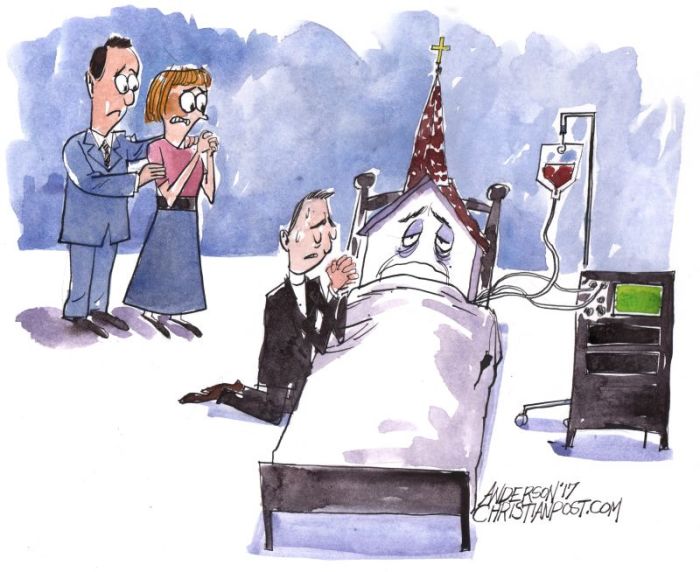Desiring God writer identifies 3 symptoms of dying church, identifies solution

A writer for the popular theology website Desiring God has identified three symptoms of a “dying church” and shared how the Body of Christ can “self-diagnose” its health and work toward healing.
In a recent article titled “Three Symptoms of a Dying Church: How to Diagnose Your Own Local Body,” Pastor David Gibson warned that one of the “defining marks of a dying church is that the people in it don’t realize it’s dying.”
“They don’t know they’re on a one-way journey to the ecclesiastical morgue. There is enough about the church that makes it seem alive and worth showing up to each week, but the symptoms of death pervade,” he said.
Drawing from the New Testament book of James, Gibson identified three symptoms of a dying church, beginning with quarreling and uncontrolled tongues within the Body of Christ.
He cited James 1:19, “Know this, my beloved brothers: let every person be quick to hear, slow to speak, slow to anger” and James 1:26, “If anyone thinks he is religious and does not bridle his tongue but deceives his heart, this person’s religion is worthless.”
“James tells us ‘these things ought not to be so’ (James 3:10), but he is having to write precisely because these things can be so,” Gibson said. “People get burnt. And uncontrolled tongues are just a symptom, not the disease.”
The second sign of a dying church is when it begins drawing “ugly lines” and “loves partiality,” according to Gibson.
“It has favorites. The rich over the poor, the haves over the have-nots,” he said. “It is honoring certain types of people and dishonoring others. There is an in-crowd in this church and an out-crowd; there is an attraction to the people with means, wealth, and status.”
Even if such socioeconomic dividing lines don’t clearly exist in a church, “we draw lines in plenty of other ways,” he warned.
“It’s what makes us feel safe in physical spaces and social groups, and what causes us to bond with some and ignore others. We draw lines between men and women, students and old people, married and single, employed and unemployed, and no doubt a myriad of other ways too.”
But drawing lines, he emphasized, makes us “so unlike God.”
“God loves the defenseless, the poor and the weak, the people with nothing to contribute, and it’s why religion that is pure before him visits orphans and widows — it cares for the unrewarding of this world (James 1:27),” Gibson said.
Finally, a church is dying when it begins to “ignore good works,” Gibson wrote, adding that the letter of James is so challenging because it is written to a church that has faith and loves the Gospel but doesn’t do what it says.
“James blindsides us: no good works, no action, means, in fact, no living faith. You might look like you’re alive. But you’re dead,” he said. “Bad words, partial lines, no good deeds. If we went to see the doctor with those symptoms and he said to us, ‘Okay, go away and speak good words, don’t draw lines, and do good deeds,’ would that help us? Is that the cure?”
At the heart of these issues is “spiritual split-personality: we are divided on the inside and that is what leads us to cause divisions on the outside,” Gibson said, adding: “A divided heart leads to divided actions.”
“We can see that this letter is all about the problem of double-ness where God intends there to be one-ness,” Gibson said of James. “Its main thesis is that there is no point ever trying to fix the tongue, or change the lines we draw, without changing the heart, the source of it all. We will never change how we relate to a poor person and a rich person in the same room unless we realize the real issue is not money but the evil inside.”
The church will die if instead of addressing issues, it simply says, “That’s just the way it is,” Gibson warned. He asked: “So what do we do with the double-mind, the divided heart, the fractured self?”
God’s grace alone, the pastor said, can take a dying church and make it live again.
“You heal the divided heart with the Gospel. With grace,” he said. “The grace of God is sweet, sweet medicine. It can make the wounded whole and begin to heal the divided heart.”
In a previous op-ed for The Christian Post, Thom Rainer the former president of LifeWay Christian Resources of the Southern Baptist Convention, revealed that somewhere between 7,000 and 10,000 churches in America will close their doors in the next year.
“And many of them die because they refuse to recognize problems before they became irreversible,” he said. Dying churches, he said, refuse to admit they are sick; are waiting on the “magic bullet pastor;” fail to take responsibility for their sins; are unwilling to change; refuse to reach the ethnically changing community, and are obsessed with returning to the “good old days.”
Rainer warned while churches have broken free from the death stages, they are rare.
“And the longer the church waits to make substantive changes, the more difficult it becomes to reverse the path,” he said. “It's significantly easier to make changes at stage one than stage four.”



























